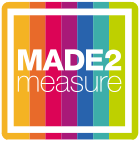Gym Mirrors - What Are My Options
Gym and Dance Studio Mirrors – What are my options?
For most of you buying mirrors for a gym or dance studio is a one off purchase. Something you have never done before and probably will never do again. You think to yourself how hard can this be? Then you do a little search online and are suddenly met with a wide range of choices; What size do I need? Should I buy acrylic or glass gym mirrors? How thick, 3mm, 4mm or 6mm? Do I need the edges polished? Do I need safety backing? How am I going to hang them?
I'm going to offer you some advice which will hopefully help you answer these questions and make the right purchase for your personal requirements.
How big is the wall?
First off you need to know how many mirrors you need. If you plan to fill a whole wall with mirrors then measure the whole width of the wall and the height. Standard stock size gym mirrors come in 1220mm or 4ft widths. Divide the total wall width in mm by 1220 and you will know how many you can fit.
For example;
Wall width; 4500mm
4500/1220 = 3.688
Therefore you can fit 3 mirrors with some space either side or if you want the room to be wall to wall mirror with each mirror made to measure then divide your total width by the next whole number to the number above (4) and you will have the width each individual mirror needs to be.
For example;
4500/4 = 1125
You need 4 mirrors each measuring 1225mm wide for wall to wall mirrors.
The height is straight forward. The standard heights are 1830mm or 6ft or 2440mm or 8ft or can be cut to any size. Most people want the mirrors full length from the skirting board up or if you are using weights and have machinery you may want ti start higher up for safety. Chequered aluminium plate can be used underneath of you think weights might be accidentally thrown against the wall.
Acrylic or glass?
Acrylic or plastic mirror is sold by some suppliers for use in gyms however it is very thin at 3mm and is prone to flexing and therefore we never recommend using it for this purpose. We have heard too many stories of people ending up with what looks like a fairground mirror. If it flexes just very slightly the right or wrong way it may give the trick of making you look better but it also might make you look bigger, either way we advise you to steer clear and stick to glass for a true reflection. Acrylic mirror has it uses and can be effective in smaller sizes and is ideal for smaller mirrors in prisons, schools or hospitals and stables.
What thickness do I need?
Likewise with the acrylic we do not recommend 3mm glass mirror and advise only using 4mm or ideally 6mm. If you are buying for a home gym or dance studio in perhaps in a spare room or garage then 4mm is perfectly adequate however for commercial gyms, dance studios, boxing clubs, yoga studios, martial arts centres etc then we strongly recommend the stronger thicker 6mm mirror.
Do I need the edges polishing?
Polishing the edges of the mirror make them smooth and perfectly straight as opposed to having a rough cut from a machine. This makes them much safer and easier to handle and ensures a perfectly straight neat edge.
Do I need safety backing?
Unless you are fitting the mirrors using adhesive then yes you definitely do. The safety backing is a special protective film that is adhered to the back of the mirror so that if the mirror were to have a large impact and break then the pieces of the broken mirror stay stuck to the safety backing on the wall rather than in small pieces over the floor. If fitting with J channels or holes with mirror screws then safety backing is essential. The only time we advise to not use safety backing is when fitting the mirrors with mirror adhesive. In this instance if the entire back surface of the mirror is covered with adhesive and stuck to a clean dry wall then the adhesive acts as the safety backing in the event of breakage.
How should I hang them?
As already mentioned, you have three or possible 4 options which I will go through and give you the pros and cons.
Adhesive;
Pros
Easy to fit
Cheaper
No need for safety backing
No visible fixings
Cons
Very permanent, difficult to remove and you won’t be able to move them if you change location.
J Channels
Pros
Easy to fit
Neat, professional finish
Good value
Cons
Only available for use with 6mm mirror, not 4mm
Only available in 3.66m lengths if only fitting one or two mirrors (they can be cut down with a hack saw)
Holes and mirror screws
Pros
Can use safety backing with 4mm mirror
Enables you to move the mirrors at a later date
Cons
More expensive
Can be awkward and difficult to fit
The final options is making your own frame for the mirrors to sit in.
If you are unsure about any of the options then please do not hesitate to contact us on 01507 472600 or email sales@made2measuremirrors.co.uk





